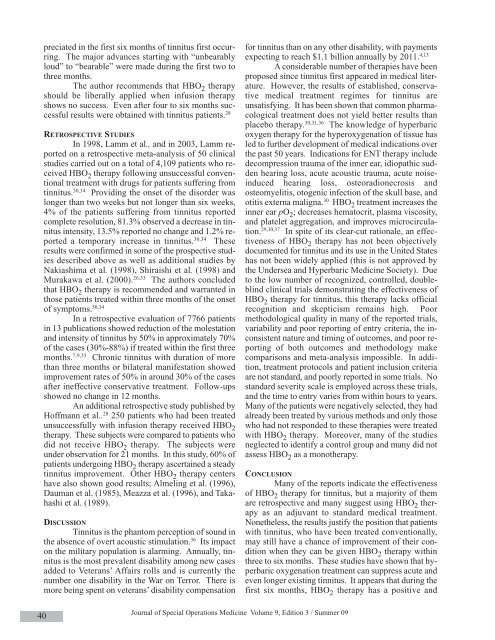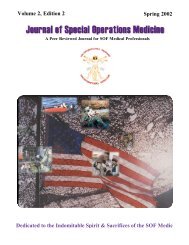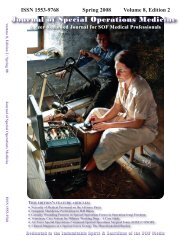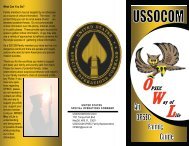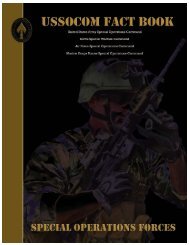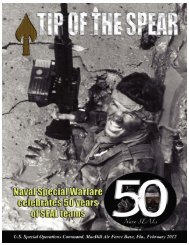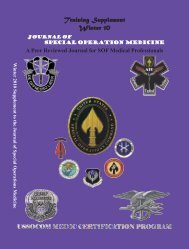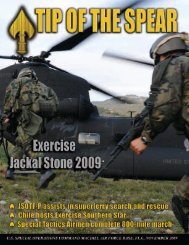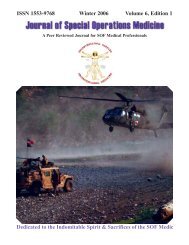preciated in the first six months of tinnitus first occurring.The major advances starting with “unbearablyloud” to “bearable” were made during the first two tothree months.The author recommends that HBO 2 therapyshould be liberally applied when infusion therapyshows no success. Even after four to six months successfulresults were obtained with tinnitus patients. 28RETROSPECTIVE STUDIESIn 1998, Lamm et al., and in 2003, Lamm reportedon a retrospective meta-analysis of 50 clinicalstudies carried out on a total of 4,109 patients who receivedHBO 2 therapy following unsuccessful conventionaltreatment with drugs for patients suffering fromtinnitus. 30,34 Providing the onset of the disorder waslonger than two weeks but not longer than six weeks,4% of the patients suffering from tinnitus reportedcomplete resolution, 81.3% observed a decrease in tinnitusintensity, 13.5% reported no change and 1.2% reporteda temporary increase in tinnitus. 30,34 Theseresults were confirmed in some of the prospective studiesdescribed above as well as additional studies byNakiashima et al. (1998), Shiraishi et al. (1998) andMurakawa et al. (2000). 26,33 The authors concludedthat HBO 2 therapy is recommended and warranted inthose patients treated within three months of the onsetof symptoms. 30,34In a retrospective evaluation of 7766 patientsin 13 publications showed reduction of the molestationand intensity of tinnitus by 50% in approximately 70%of the cases (30%-88%) if treated within the first threemonths. 7,9,35 Chronic tinnitus with duration of morethan three months or bilateral manifestation showedimprovement rates of 50% in around 30% of the casesafter ineffective conservative treatment. Follow-upsshowed no change in 12 months.An additional retrospective study published byHoffmann et al.. 28 250 patients who had been treatedunsuccessfully with infusion therapy received HBO 2therapy. These subjects were compared to patients whodid not receive HBO 2 therapy. The subjects wereunder observation for 21 months. In this study, 60% ofpatients undergoing HBO 2 therapy ascertained a steadytinnitus improvement. Other HBO 2 therapy centershave also shown good results; Almeling et al. (1996),Dauman et al. (1985), Meazza et al. (1996), and Takahashiet al. (1989).DISCUSSIONTinnitus is the phantom perception of sound inthe absence of overt acoustic stimulation. 36 Its impacton the military population is alarming. Annually, tinnitusis the most prevalent disability among new casesadded to Veterans’ Affairs rolls and is currently thenumber one disability in the War on Terror. There ismore being spent on veterans’ disability compensationfor tinnitus than on any other disability, with paymentsexpecting to reach $1.1 billion annually by 2011. 4,13A considerable number of therapies have beenproposed since tinnitus first appeared in medical literature.However, the results of established, conservativemedical treatment regimes for tinnitus areunsatisfying. It has been shown that common pharmacologicaltreatment does not yield better results thanplacebo therapy. 30,31,36 The knowledge of hyperbaricoxygen therapy for the hyperoxygenation of tissue hasled to further development of medical indications overthe past 50 years. Indications for ENT therapy includedecompression trauma of the inner ear, idiopathic suddenhearing loss, acute acoustic trauma, acute noiseinducedhearing loss, osteoradionecrosis andosteomyelitis, otogenic infection of the skull base, andotitis externa maligna. 30 HBO 2 treatment increases theinner ear pO 2 ; decreases hematocrit, plasma viscosity,and platelet aggregation, and improves microcirculation.29,30,37 In spite of its clear-cut rationale, an effectivenessof HBO 2 therapy has not been objectivelydocumented for tinnitus and its use in the <strong>United</strong> <strong>States</strong>has not been widely applied (this is not approved bythe Undersea and Hyperbaric Medicine Society). Dueto the low number of recognized, controlled, doubleblindclinical trials demonstrating the effectiveness ofHBO 2 therapy for tinnitus, this therapy lacks officialrecognition and skepticism remains high. Poormethodological quality in many of the reported trials,variability and poor reporting of entry criteria, the inconsistentnature and timing of outcomes, and poor reportingof both outcomes and methodology makecomparisons and meta-analysis impossible. In addition,treatment protocols and patient inclusion criteriaare not standard, and poorly reported in some trials. Nostandard severity scale is employed across these trials,and the time to entry varies from within hours to years.Many of the patients were negatively selected, they hadalready been treated by various methods and only thosewho had not responded to these therapies were treatedwith HBO 2 therapy. Moreover, many of the studiesneglected to identify a control group and many did notassess HBO 2 as a monotherapy.CONCLUSIONMany of the reports indicate the effectivenessof HBO 2 therapy for tinnitus, but a majority of themare retrospective and many suggest using HBO 2 therapyas an adjuvant to standard medical treatment.Nonetheless, the results justify the position that patientswith tinnitus, who have been treated conventionally,may still have a chance of improvement of their conditionwhen they can be given HBO 2 therapy withinthree to six months. These studies have shown that hyperbaricoxygenation treatment can suppress acute andeven longer existing tinnitus. It appears that during thefirst six months, HBO 2 therapy has a positive and40Journal of <strong>Special</strong> <strong>Operations</strong> Medicine Volume 9, Edition 3 / <strong>Summer</strong> 09
promising effect on tinnitus. However, the most significantimprovement in tinnitus is notable when HBO 2therapy is administered within the first three months atpressures between 2.0 and 2.5 ATA.FUTURE RESEARCHBecause of its subjective nature, assessing thelevel of distress remains the primary impediment in theappraisal of tinnitus studies. In patient studies, differencesin the level of tinnitus, duration, medical history,and involvement of etiological factors in the initiationand mental habituation may obscure any correlationwith a treatment outcome. 38 There is a case for largerandomized trials of high methodological rigor in orderto define the true extent of the benefit (if any) from administrationof HBO 2 therapy to patients sufferingfrom tinnitus. A critical multicenter analysis with identicaldocumentation of a large number of patientsshould establish the therapeutic value of HBO 2 therapyfor well defined groups of patients. In addition,further studies to evaluate the actual effect of HBO 2therapy should concentrate on the development of double-blind,case controlled trials.Though the authors of several studies reportvarious degrees of improvement in up to 50% to 70%of patients undergoing HBO 2 therapy, actual cure oftinnitus is rare. In no study was it reported to be greaterthan 3.9%. If HBO 2 therapy is scientifically establishedto be beneficial in the treatment of tinnitus, costanalysis for treating tinnitus versus paying out VA benefitsshould be conducted. Will curing approximately4% of cases significantly reduce VA compensation fortinnitus and/or will a significant reduction in a patient’stinnitus affect VA compensation? A final evidencebased recommendation will be possible after conclusionof several randomized, controlled, double-blindstudies. Currently, there are six major prospective trialsbeing carried out in Germany. 7,9ACKNOWLEDGEMENTSThe opinions or assertions contained herein are theprivate views of the author and are not to be constructed asofficial or reflecting the views of the Department of theNavy, Department of Defense, nor the U.S. Government.REFERENCES1. Medical College of Wisconsin (2001). Noise-induced hearingloss. Retrieved March 16, 2009, fromHealthlink MedicalCollege of Wisconsin Website: http://healthlink.mcw.edu/article/965928293.html2. Humes, LE, Joellenbeck, LM, Durch, JS (2006). Noise andmilitary service: Implications for hearing loss and tinnitus.Washington D.C.: The National Academies Press.3. Deschler, DG, (2008). Pathogenesis, diagnosis and treatmentof tinnitus. Retrieved December 2008, from Up-to-date Wesite: http://utdol.com/online/tinnitus/treatment.html4. Lite, J. (2007). Iraq & Afghanistan war vets suffer from hearingloss, tinnitus. The New York Daily News, November 11.5. American Hearing Research Foundation (2008). Noise-inducedhearing loss. Retrieved March 16, 2009, from American HearingResearch Foundation Website: http://www.americanhearing.org/disorders/hearing/noise_induced.html6. Axelsson, A; Prasher, D. (2000). Tinnitus induced by occupationaland leisure noise. Noise & Health:A QuarterlyInter-disciplinary International Journal; 2(8): 47-54.7. Reimer Hyperbaric of Canada (1998). Hyperbaric oxygen inthe treatment of sudden deafness, acute tinnitus and acuteacoustic trauma. Retrieved March, 5 2009, from Reimer Hyperbaricof Canada Website: http://www.reimerhbo.com/tinnitus.html8. Oeken, Jens. (1998). Distortion product otoacoustic emissionsin acute acoustic trauma. Noise & Health: A Quarterly InterdisciplinaryInternational Journal; 2(1): 56-66.9. Keate, B. (2008). Hyperbaric oxygen therapy for tinnitus.Retrieved March 16, 2009, from Arches Tinnitus FormulasWebsite: http://www.tinnitusformula.com/infocenter/articles/treatments/hyperbaric.aspx10. Naval Safety Center (2008). Acquisition safety – noise controlaboard ships. Retrieved December 2, 2008, from Navy SafetyCenter Website: http://www.safetycenter.navy.mil/acquisition/noise/index.aspx11. National Institute of Health (2008). Noise-induced hearing lossRetrieved March 16, 2009, fromNational Institute on Deafnessand Other Communication Disorders Website:http://www.nidcd.nih.gov/health/hearing/noise.aspx12. Whittle, R. (2006). Hearing loss on rise among troops: Armyplans to reduce military audiologist, add civilians. The DallasMorning News, March 5, p.A10.13. MSNBC (2008). Hearing loss is silent epidemic in U.S. Troops:Soldiers coming home with permanent hearing damage andringing in ears. Retrieved December 2, 2008, from MSNBCWebsite: http://www.msnbc.msn.com/id/23523729/.14. Rosen, E.J.; Vrabec, J.T.; Quinn, F.B.. (2001). Noise-inducedhearing loss. Grand Rounds Presentation, UTMB, Dept. of Otolaryngology;January 2001.15. Bennett, MH; Kertesz, T; Yeung, P. (2005). Hyperbaric oxygentherapy for idiopathic sudden sensorineural hearing loss and tinnitus:A systematic review of randomized controlled trials. TheJournal of Laryngology and Otology; 119(10): 791-798.16. Bennett, MH; Kertesz, T; Yeung, P. (2007). Hyperbaric oxygentherapy for idiopathic sudden sensorineural hearing loss and tinnitus.Cochrane Database of Systematic Reviews; Issue 1. Art.17. Rabinowitz, PM. (2000). Noise-induced hearing loss. RetrievedMarch 16, 2009, from The American Family Physician Website:http://www.aafp.org/afp/20000501/2749.html18. Bredenkamp, JK; Schoenfield. (2008). Noise-induced hearingloss and its prevention. Retreived March 16, 2009, from MedicineNet Website: http://www.medicinenet.com/noise_induced_hearing_loss_and_its_prevention/article.html19. Daniilidis, IC. (2004). Evaluation of various therapeuticschemes in the treatment of tinnitus due to acute acoustictrauma. Kulak Burun Bogaz Ihtis Derg; 12(5-6): 107-114.Tinnitus, a Military Epidemic:Is Hyperbaric Oxygen Therapy the Answer?41
- Page 1 and 2: Volume 9, Edition 3 / Summer 09 Jou
- Page 3 and 4: An 18D deworms a camel during a “
- Page 5 and 6: Field Evaluation and Management of
- Page 7 and 8: The circumferential anchoring strip
- Page 9 and 10: In doing so, all the skin is closed
- Page 11 and 12: NATO SOF Transformation and theDeve
- Page 13 and 14: current and future operations, thes
- Page 15 and 16: sion of a physician, and limited pr
- Page 17 and 18: REFERENCES1. James L. Jones, “A b
- Page 19 and 20: This article is the first of two me
- Page 21 and 22: Figure 4 : A Special Forces medic c
- Page 23 and 24: exposure. Conversely, the customary
- Page 25 and 26: 7. Ted Westmoreland. (2006). Attrib
- Page 27 and 28: first three days of injury, althoug
- Page 29 and 30: 9. Markgraf CG, Clifton GL, Moody M
- Page 31 and 32: the only sign of OCS may be elevate
- Page 33 and 34: E. The canthotomy allows for additi
- Page 35 and 36: 33. Rosdeutscher, J.D. and Stradelm
- Page 37 and 38: Tinnitus, a Military Epidemic:Is Hy
- Page 39 and 40: The development of chronic NIHL pro
- Page 41 and 42: supplied by diffusion. During expos
- Page 43: similar to those of other authors,
- Page 47 and 48: ADDITIONAL REFERENCESHoffmann, G; B
- Page 49 and 50: et al. demonstrated that both right
- Page 51 and 52: TYPICAL CHEST RADIOGRAPH FINDINGS I
- Page 53 and 54: 11. Norsk P, Bonde-Petersen F, Warb
- Page 55 and 56: ABSTRACTS FROM CURRENT LITERATUREMa
- Page 57 and 58: tourniquet times are less than 6 ho
- Page 59 and 60: tal from July 1999 to June 2002. In
- Page 61 and 62: Operation Sadbhavana: Winning Heart
- Page 63 and 64: CENTRAL RETINAL VEIN OCCLUSION IN A
- Page 65 and 66: of the X chromosome. Notable is tha
- Page 67 and 68: AUTHORS*75th Ranger Regiment6420 Da
- Page 69 and 70: Casualties presenting in overt shoc
- Page 71 and 72: PSYCHOLOGICAL RESILIENCE AND POSTDE
- Page 73 and 74: spondents without PTSD (M = 4.6, SD
- Page 75 and 76: patients, whereas the mean score of
- Page 77 and 78: 29. Whealin JM, Ruzek JI, Southwick
- Page 79 and 80: average, time between return from d
- Page 81 and 82: ing functioning in both PTSD (Zatzi
- Page 83 and 84: Editorial Comment on “Psychologic
- Page 85 and 86: Blackburn’s HeadhuntersPhilip Har
- Page 87 and 88: The Battle of Mogadishu:Firsthand A
- Page 89 and 90: Task Force Ranger encountered enemy
- Page 91 and 92: Peter J. Benson, MDCOL, USACommand
- Page 93 and 94: Numerous military and civilian gove
- Page 95 and 96:
Anthony M. Griffay, MDCAPT, USNComm
- Page 97 and 98:
This is a great read that speaks di
- Page 99 and 100:
and twenty-eight. Rabies immune glo
- Page 101 and 102:
Rhett Wallace MD FAAFPLTC MC SFS DM
- Page 103 and 104:
LTC Craig A. Myatt, Ph.D., HQ USSOC
- Page 105 and 106:
LTC Bill Bosworth, DVM, USSOCOM Vet
- Page 107 and 108:
Europe, Mideast, Africa and SWAU.S.
- Page 109 and 110:
SOF and SOF Medicine Book ListWe ha
- Page 111 and 112:
TITLE AUTHOR ISBNCohesion, the Key
- Page 113 and 114:
TITLE AUTHOR ISBNI Acted from Princ
- Page 115 and 116:
TITLE AUTHOR ISBNRats, Lice, & Hist
- Page 117 and 118:
TITLE AUTHOR ISBNThe Healer’s Roa
- Page 119 and 120:
TITLE AUTHOR ISBNGuerilla warfare N
- Page 121 and 122:
TITLEAUTHORBlack Eagles(Fiction)Bla
- Page 123 and 124:
TITLE(Good section on Merrill’s M
- Page 125 and 126:
GENERAL REFERENCESALERTS & THREATSB
- Page 127 and 128:
Aviation Medicine Resources: http:/
- Page 129 and 130:
LABORATORYClinical Lab Science Reso
- Page 131 and 132:
A 11 year old boy whose tibia conti
- Page 133 and 134:
Meet Your JSOM StaffEXECUTIVE EDITO
- Page 135 and 136:
Special Forces Aidman's PledgeAs a


